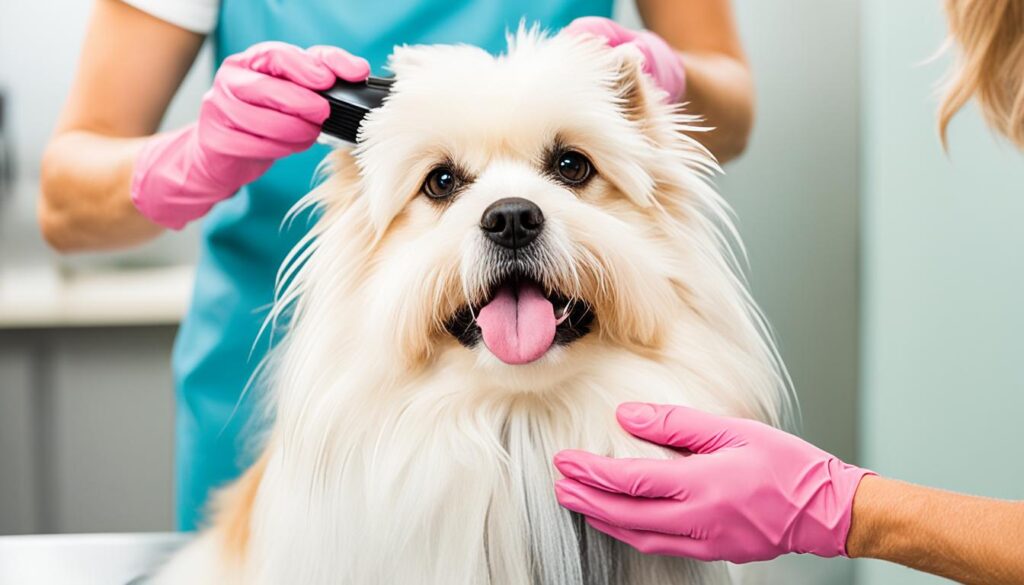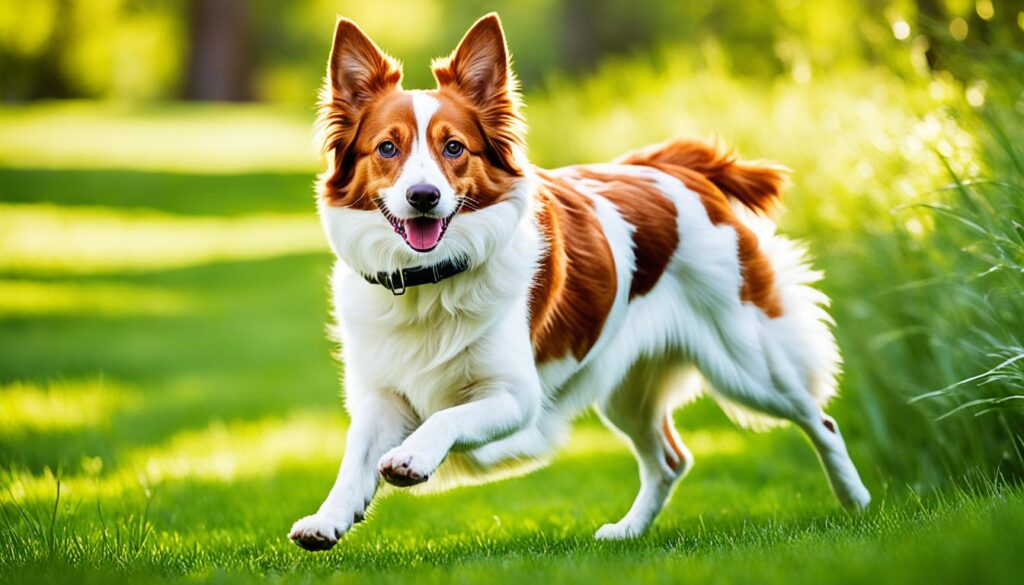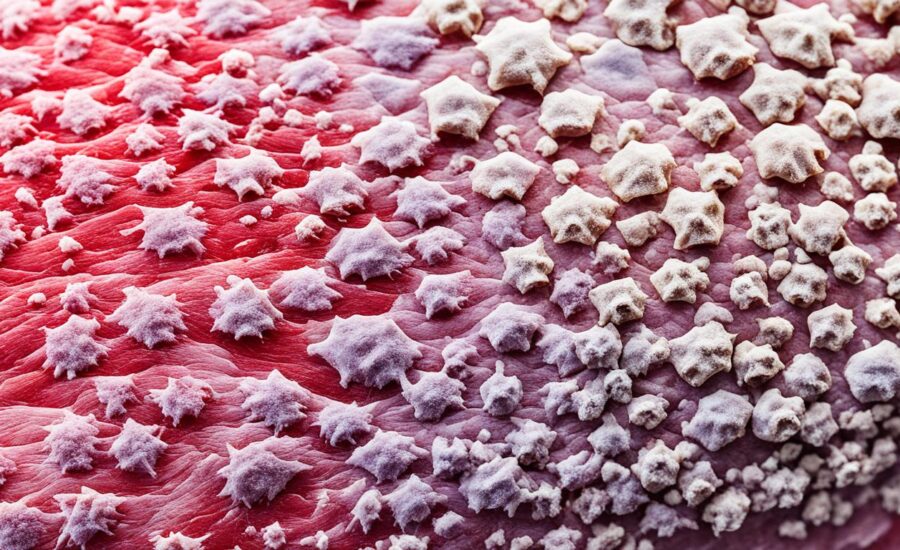Is your pet scratching, biting, or licking more than usual? This might not be just ordinary behavior. It could signal a deeper issue with your furry friend’s health. Knowing about pet skin conditions and grooming can help you tell normal actions from a health problem. The health of your pet’s skin is important. It shows how well your pet is on the inside. When we combine good grooming with knowledge about skin care, we can help our pets feel better. In this article, we’ll show how grooming is not just for looks. It also protects pets from skin problems.
Key Takeaways
- Spotting signs of pet skin issues early can stop bigger health problems.
- Omega-3 rich supplements are important for your pet’s skin health.
- Grooming does more than clean; it’s key for finding and treating skin issues.
- Knowing about pet skin care is crucial for owners to care for their pets fully.
- Grooming affects more than just a pet’s coat. It’s vital for their skin health and comfort.
An Overview of Common Pet Skin Issues
Knowing about common pet skin issues is key for pet care. It helps owners protect their pets better. There are many skin issues that can discomfort pets. This part talks about major skin problems in pets and dog grooming tips and cat skin problems every owner needs to know.
Flea allergy dermatitis causes a lot of skin problems in pets. It makes them itch badly and can lead to infections. Watching for fleas and regular grooming can lower this risk. Also, there’s atopic dermatitis. It makes skin scaly and can cause ear infections. Spotting signs early is crucial, so watch your pet’s skin and actions.
Hot spots are painful, inflamed areas that show up suddenly. They get worse from much scratching or licking. They need fast care. Ringworm, caused by fungus, looks like circular hair loss but isn’t an actual worm. Both pets and humans can get it. Seeing these signs means you should talk to a vet quickly.
Pyoderma, a bacterial issue, leads to pustules and bad smell. Yeast infections make skin greasy and smelly. Keeping your pet’s space clean and good grooming habits can prevent or lessen these problems.
| Condition | Common Symptoms | Grooming and Management Tips |
|---|---|---|
| Flea Allergy Dermatitis | Itching, red and inflamed skin | Regular flea control, bathing with flea-preventive shampoo |
| Atopic Dermatitis | Scaly skin, recurrent ear infections | Use hypoallergenic products, increase Omega-3 intake |
| Hot Spots | Acute inflamed patches, pain | Trimming around the area, keeping it dry, and using medicated sprays |
| Ringworm | Circular hair loss, scaly skin | Antifungal treatment, avoiding contact with infected areas |
| Pyoderma | Pustules, foul odor | Cleaning the affected area, antibiotic therapy as per vet’s prescription |
| Yeast Infection | Greasy skin, distinctive odor | Anti-yeast shampoo, keeping the skin clean and dry |
A good way to deal with common pet skin issues is to be proactive. That means treating problems and also grooming regularly. For dogs, dog grooming tips help avoid skin troubles by keeping them clean. For cats, regular brushing and checking for signs during cuddle times helps catch cat skin problems early.
In conclusion, knowing about these skin conditions and grooming well are key to a healthy, happy pet. Proper grooming tailored to your pet helps prevent issues and solve them faster if they arise.
Debunking Myths About Pet Skin Health
Many pet owners aim to do what’s best for their animal friends. However, some beliefs about pet skin health are wrong and can be harmful. By learning about pet dermatology care and pet skin allergies, we can take better care of our pets. It’s important to correct these myths to treat skin conditions correctly.
Myth vs. Fact: Fleas Are Not the Only Cause of Itching
Fleas often make pets itch, but they’re not the only cause. Allergies, food problems, and stress can also make pets uncomfortable. It’s important to find out the real cause to treat skin issues right.
Sun Protection: Understanding the Risk of Sunburn in Pets
Pets can get sunburned, especially those with light or thin fur. Providing shade and using pet-friendly sunscreen can protect them. This helps prevent skin cancer and other sun-related problems.
The Misunderstanding of Skin Conditions as Purely Cosmetic
Some people think skin problems in pets are just cosmetic. They don’t see that these issues might show bigger health problems. Good pet dermatology care goes deeper and treats these underlying issues.
Are Human Medications Safe for Pets?
Using human medicine on pets can be risky due to different metabolisms. Always ask a vet before giving any medicines for skin allergies or conditions.
Is Frequent Bathing Beneficial or Harmful?
Bathing is part of keeping pets healthy, but too much can harm their skin. It can cause dryness and irritation. Finding the right bathing routine for each pet is crucial.
Knowing the truth about these myths helps us care for our pets better. By sharing correct information, we ensure our pets get the care they need. A well-informed approach to pet skin health is a caring one.
| Myths | Truths | Best Practices |
|---|---|---|
| Only fleas cause itching | Itching can be due to a variety of causes | Seek veterinary diagnosis for itching |
| Pets can’t get sunburn | Pets can suffer from sunburn | Provide shade and use pet-safe sunscreen |
| Skin issues are just cosmetic | Skin issues may signal deeper health problems | Investigate underlying causes of skin issues |
| Human medications are okay for pets | Human meds can be toxic to pets | Consult a vet before medicating a pet |
| Frequent baths prevent skin issues | Over-bathing may damage skin health | Bathe pets according to their specific needs |
By debunking myths and learning more, we can provide better care. This leads to healthier, happier pets. Let’s commit to raising our pet care standards.
Breeds with Inherent Skin Sensitivities
Like people, dogs can also inherit certain skin conditions. Knowing about these sensitivities helps with better pet hair care and managing pet skin allergies. It allows pet owners to give their pets the right care to improve their quality of life.
Bulldogs and Skin Fold Dermatitis
Bulldogs’ wrinkles can trap moisture and lead to dermatitis. It’s important to regularly clean and dry these folds as part of pet hair care. This will keep them healthy and happy.
Boxers’ Allergic Reactions and Sensitive Skin
Boxers often have allergies and sensitive skin. Owners must look for signs of discomfort. Using hypoallergenic products helps ease their Boxer’s sensitive skin.
Golden Retrievers and Prone Hot Spots
Golden Retrievers are prone to hot spots because of their thick fur. Grooming is key to prevent these. Regular brushing and moisturizing shampoos keep their skin healthy.
Shar-Pei: Pyoderma and Yeast Infections
Shar-Pei’s skin folds make them prone to infections. Frequent health checks and grooming are essential. Keeping their skin folds clean and dry helps prevent infections and keeps them healthy.
Understanding each breed’s skin issues helps us care for them better. Proper pet hair care and allergy awareness prevent skin problems. This knowledge allows owners to keep their pets comfortable and healthy.
The Role of Grooming in Pet Skin Health
Understanding pet grooming techniques is key for pet owners. It helps ensure their pet’s skin stays healthy. Like people, pets need clean habits for their health. Regular grooming stops skin problems and comforts your pet.
For those seeking dog grooming tips, remember less can be more. Too much bathing removes essential oils, causing dry skin and irritation. Using a hypo-allergenic shampoo protects your pet’s skin and keeps it balanced.
Pet hair care is crucial for skin health. Brushing with a good pin brush untangles fur and adds shine. It also wakes up the skin and spreads natural oils in the coat. This makes the coat look great and protects it more.
Getting advice from groomers and vets helps create a grooming plan for your pet. This plan considers the pet’s breed, coat type, and skin issues.
Flea and tick control is very important for stopping skin problems. The right steps guard your pet from discomfort and skin issues.

In summary, grooming is more than making your pet look good. It’s crucial to pet care, keeping them away from skin troubles. A consistent grooming schedule also spots and fixes issues early. This shows how grooming protects pet skin health.
Treating and Managing Pet Skin Allergies
When pets scratch and feel uncomfortable because of skin allergies, owners seek help from pet dermatology care. Finding out what causes allergies and choosing the right grooming routines are key. It requires patience and careful attention to treat pet skin conditions.
Identifying Environmental and Dietary Allergens
Understanding allergies means knowing what in the environment or diet makes a pet uneasy. Vets help find these allergens with tests and exams. They talk with owners about home or outside things and the pet’s food that could be problems.
Grooming Products and Techniques for Allergy-Prone Pets
Choosing the right grooming products and ways to use them is important for pets with allergies. Some pets need special shampoos or sprays to feel better. Regular grooming keeps allergens away, and some products like Zesty Paws Scoot Away Chews help from the inside. Here’s a table comparing grooming aids for pets with allergies:
| Product Type | Benefits | Recommended Frequency |
|---|---|---|
| Hypoallergenic Shampoo | Reduces skin irritants without harsh chemicals | As prescribed by veterinarian |
| Anti-Itch Spray | Provides immediate relief from itching and hot spots | Use as needed, avoiding overuse |
| Zesty Paws Chews | Supports digestive health, potentially reducing allergic reactions | Daily, as part of nutritional regimen |
Good pet dermatology care and the best grooming techniques for treating pet skin conditions are key to managing allergies. Working with a vet helps owners understand and meet their pet’s skin health needs.
Factors That Influence Skin Conditions in Pets
Our furry friends often suffer from common pet skin issues. These problems can really affect their happiness. Knowing what affects pet skin health is key to helping them. We can control some factors, but others need us to watch and make changes. By understanding these factors, we can make our pets’ lives healthier and happier.
Environmental Impacts on Pet Skin Health
Changes in seasons and extreme weather can bother pets just like us. These conditions can make skin problems worse or cause new ones. To protect your pet’s skin, keep your home’s temperature steady. Use moisturizing products to guard their skin from the weather. This helps maintain pet skin health despite environmental changes.

Nutritional Support for Healthy Skin and Coat
A healthy diet is crucial for health, especially for pets. The right nutrition keeps their skin and coat looking great. Foods rich in Omega-3 fatty acids are recommended for pet skin health. These nutrients help the skin stay healthy and can lower inflammation linked to common pet skin issues.
| Nutritional Component | Benefits for Skin Health | Food Sources |
|---|---|---|
| Omega-3 Fatty Acids | Moisturizes skin, reduces inflammation | Salmon, flaxseeds, fish oil supplements |
| Vitamins A & E | Promotes skin healing, enhances barrier function | Carrots, spinach, almonds |
| Zinc | Supports skin structure, aids in wound healing | Meat, pumpkin seeds, lentils |
| Proteins | Builds and repairs skin tissue | Lean meats, eggs, peas |
The Importance of Regular Veterinary Checks
Visiting the vet regularly is crucial for pet skin health. Catching issues early can stop them from getting worse. Vets can suggest diet or environment changes, besides treatments. They offer advice tailored to your pet’s specific needs.
Understanding Pet Skin Conditions and Grooming Solutions
Maintaining pet skin health is crucial. It requires understanding various skin conditions. This Understanding Pet Skin Conditions and Grooming Solutions helps pet owners. They can solve issues and prevent them with proper care.
By mixing professional vet advice with at-home grooming, we meet each breed’s skin care needs. This eliminates guesswork in maintaining their skin. As seasons change, this balanced care protects pets from harmful weather.
Nutritional support is key for healthy skin. It should complement grooming. A good nutrition plan includes essential fats and vitamins. This strengthens the skin.
Working closely with vets ensures pets get the best care. This partnership allows for customized treatment plans. They might include special grooming products or supplements for skin health.
The health of a pet’s skin shows their overall health. Grooming and vet care for skin health is vital.
- Assessment of breed-specific grooming needs
- Selecting appropriate hypo-allergenic shampoos
- Incorporation of Omega-3 fatty acids and vitamins into diet
- Regular health checks to pre-empt potential issues
A strong grasp of Understanding Pet Skin Conditions and Grooming Solutions is important. It helps pet owners improve their pets’ lives. This knowledge is crucial for keeping pets happy and healthy.
Conclusion
In concluding our detailed guide, it’s clear that knowing about pet skin conditions and grooming solutions is crucial. Every pet owner aiming for their pet’s happiness needs this knowledge. It goes beyond just a clean coat or an occasional wash.
This know-how is key for being proactive and informed about pet skin allergies and needs. These vary by breed and surroundings.
Regular and careful grooming helps prevent common skin issues in pets. It highlights the need for the right tools and products. Brushing not only strengthens the bond between you and your pet. It also shows your dedication to their health.
Keen observation and a good grooming routine can reduce allergy pains. This can lead to a happier, more comfortable pet.
Knowing about your pet’s skin health includes dealing with allergies and providing good food and vet care. Following these steps helps prevent and treat skin problems. As a pet owner, your true commitment to grooming solutions and understanding pet skin conditions ensures your pet’s well-being and energy.
FAQ
What are some common pet skin issues?
How can I tell if my pet has skin allergies?
Are there any misconceptions about pet skin health?
Can certain dog breeds have more skin issues than others?
What is the role of grooming in maintaining my pet’s skin health?
What grooming techniques can help pets with allergies?
What are the factors that can influence pet skin conditions?
How do weather conditions affect pet skin health?
Source Links
- https://felicitails.com/blogs/about-dog-grooming/grooming-your-pet-for-better-skin-health
- https://www.lochhavenvet.com/services/dog-wellness/dog-skin-problems
- https://www.clipit-grooming.com/post/8-common-dog-coat-and-skin-conditions-explained

